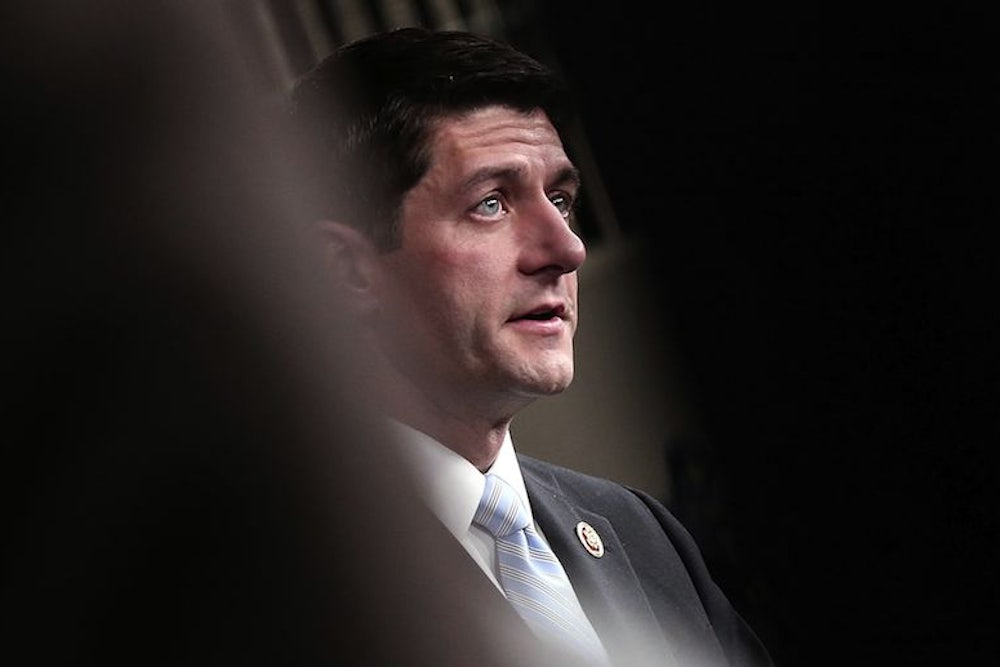The rollout of Paul Ryan’s new budget this week was not one of the congressman’s better moments. In addition to the entirely apt uproar on the left about the cruelty of his cuts and the dodginess of his reasoning, Ryan took an unusual amount of flak from the right. The Heritage Foundation grumbled that Ryan had preserved Obama’s tax increases, while Larry Kudlow, CNBC’s resident supply-side evangelist, used an interview with Ryan to highlight his accounting gimmicks.
But the unkindest cut of all came from the mainstream political press, which, even after Ryan’s failed vice presidential bid, was still touting him as the Republican Party’s intellectual leader, and very likely its future. Alas, the reverence was distinctly lacking on Tuesday. The New York Times’ lead story on Ryan framed his budget as an exercise in cynicism, pointing out up high that it would cut the deficit “largely by rolling back President Obama’s legislative accomplishments while also taking advantage of the savings they created.” 1 NBC’s Chuck Todd, the dean of White House political analysts, came right out and dropped the c-word explicitly: “[Ryan] cynically assumes ObamaCare’s $716 billion in Medicare cuts as a way to balance the budget in 10 years (despite Ryan saying he and Romney would restore those cuts during the campaign).” Todd went on to block-quote a now-embarrassing riff from Ryan’s convention speech.
Which is to say, in one fell swoop, Ryan has done to himself what he never accomplished through years of fiscal lunacy (this is his third high-profile budget; none has lingered for very long on planet Earth) and months of campaign-trail dishonesty (Ryan’s convention speech contained lie after lie after lie): He’s made it hard for political reporters to take him seriously. What the hell happened?
The fall from grace must be especially puzzling to Ryan, whose great skill has been exploiting the mores of the mainstream media. He has long understood that you could push a Randian agenda of tax cuts for the rich and spending cuts for the poor and, so long as you affected a plainspoken Midwestern-ness, you’d still look like a stand-up guy. He discovered it was possible to command wonkish cred while spouting endless budgetary nonsense, so long as you coated it in the language of “baselines” and “tax exclusions.” As my former colleague Jonathan Chait has written, “Ryan has grasped that the aura of specificity he has cultivated paradoxically renders the specifics themselves irrelevant.”
Above all, Ryan figured out that, in the heat of an election, the average political reporter wasn’t going to bust him for even the most brazen whoppers and policy-reversals. The stories, such as they were, would be ghettoized in the fact-checking precincts of the media establishment—not exactly a common destination for the average voter. If the policy controversies seeped into front-page stories, they would usually be cloaked in the he-said/she-said vernacular of false equivalence.
Hence Ryan’s willingness during the campaign to attack Obama for “raiding” Medicare to the tune of $716 billion dollars, even though the budget he released earlier that year advocated the same thing. A typical Politico piece left the accusation of hypocrisy to an Obama spokesman—“Congressman Ryan knows that the $716 billion in Medicare savings that he included in two of his own budgets do not cut a single guaranteed Medicare benefit”—where it could, of course, be easily dismissed. (In fairness, some outlets like the Times did note the change in position themselves, but tended to do it in passing, far down in their pieces.)
But there’s one insight Ryan didn’t fully glean: You can treat politics like a game, and you can assume reporters will, too. But you can’t go so far as to admit it’s a game.
During the campaign, Ryan never broke character. When pressed on Medicare, he and his handlers would simply double-down: “Having already saddled the country with $5 trillion in new debt while cutting Medicare by $716 billion to pay for 'Obamacare,' President Obama cannot defend his broken promises,” an aide told the Times last August, “so he and his campaign are resorting to tired and misleading attacks.”
The problem with Ryan’s new budget—in which he reverts to his pre-campaign position on Medicare cuts—is that it more or less concedes the whole campaign, with its righteous defense of Medicare, was a charade. Among the Washington press corps, this is a major no-no. Depending on the circumstances, reporters may be happy to enable these reinventions, but they are loath to acknowledge their role in them. Ryan basically rubbed their noses in it. Even Politico, whose coverage most resembles ends-justifying scorekeeping, seemed to bridle at the transgression. The last five paragraphs of its main Ryan budget piece catalogued his history of Medicare flip-flops. The closing riff quoted a centrist budget wonk—the kind of person Ryan has made a career of courting—essentially outing him as full of it.
There’s a lesson in here for pols on the make: You can commit all manner of policy sins. If you’re earnest and charming, you can even attack your opponents for ideas over which you share paternity. But do not—I repeat, do not—show up the political media. Hell hath no fury like my fellow hacks spurned.
In the subsequent print version of the story, the Times moved that original language three paragraphs down and cut the phrase "while also taking advantage of the savings they created."
